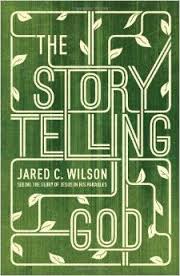⏱️ Estimated Reading Time: 4 min read
The parables of Jesus have long been beloved portions of Scripture. From the Parable of the Good Samaritan to the Parable of the Prodigal Son, these stories have provided believers with object lessons on the Kingdom of God and the Christian life. Unfortunately, many have viewed the parables as little more than moral stories with a good message, a heartwarming tale of how to be good. Jared Wilson in his book The Storytelling God: Seeing the Glory of Jesus in His Parables, seeks to correct that notion declaring the parables are far more than nice stories with a happy ending.
Wilson rightly urges the reader to “Throw away your Flannelgraphs. They are flat and soft, and the story of Jesus is neither.” The parables of Jesus are more than moralistic tales. Conversely, as Wilson notes, “the parables don’t just tell us about the true ways of life but shine into darkened hearts the way, the truth, and the life.” They are stories whose purpose and intent is to direct the reader to Jesus. They bring to life the kingdom of God and its purpose.
Beginning with a discussion on the Gospel of the Kingdom and walking through most of the more well known parables, Wilson clearly establishes his overarching premise that the parables are a declaration of the reality of the Kingdom of God and the tension that exists in this life between a world fraught with sin and the life that is found in Jesus. To a people filled with messianic fervor, Wilson aptly notes “The gospel of the kingdom is the announcement that Jesus the Messiah has arrived and has begun restoring God’s will on earth in and through himself.” This declaration is rooted in Genesis 3:15 and weaves its way through the entire biblical corpus. In the parables, Jesus outlined just what this kingdom looks like, essentially what your kingdom come and your will be done on earth as it is in heaven is truly all about.
Wilson has a great gift of extrapolating the underlying message found in the parables, a gift that is clearly evident throughout this book. For instance, in his discussion of the Parable of the Good Samaritan, he avers “The story of the good Samaritan is a parable about justice and anthropology. It relocates a person’s “center of the universe” by jostling his dearly held assumptions about the people in it.” Those who affirm this particular parable is simply a call to help our neighbor are correct but only in part. In reality, it is a commentary on social justice, what Wilson calls a rebuke “to the idea that the gospel of the kingdom has nothing to do with taking care of the poor, sick, naked, or hungry.” Taking care of those in need has long been something God has called His people to be about doing and something He chastised them for neglecting. In the life of Jesus we find one who demonstrated his love by dying on the cross. There is no greater love than that. Loving our neighbor as noted in the Parable of the Good Samaritan means we must love our friends and enemies.
For those desiring to have a more holistic understanding of the parables, this is a book I highly recommend. Wilson does a masterful job of engaging the parables as a whole as well as the specific parables he discusses in this book. His constant focus is driving home the reality that the parables are more than nice childish stories that tell a neat moral lesson. They are far more than that given they are “smart bombs, full of explosive life to those who would embrace the power behind them.” For those who are willing to embrace their powerful message, Wilson’s book is a helpful guide to that end and is well worth your time reading and including as part of your Bible study when you encounter the parables.
This book is available for purchase from Crossway Books by clicking here.
I received this book for free from Crossway Books for this review. I was not required to write a positive review. The opinions I have expressed are my own. I am disclosing this in accordance with the Federal Trade Commission’s 16 CFR, Part 255 : “Guides Concerning the Use of Endorsements and Testimonials in Advertising.”




